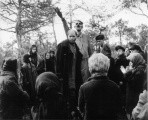
World War II: 60 Years After 2005 / Idi i smotri / USSR 1985
A film describing the apocalypse of the terrors of war and suffering, whose chief player is a 14-year-old boy called Flyora determined to join the partisan resistance. Awarded the Gold Prize at the 14th IFF in Moscow in 1985, the film is set during the Second World War in Belorussia, where more than six hundred villages were burned down by the Germans.

In the summer of 1943, 14-year-old Flyora is a naïve Belorussian boy, determined to join the partisan resistance movement. By the end of the story, he is a human wreck, from whose face all traces of childish innocence have disappeared forever. Flyora suffers greatly, yet still manages to experience tragicomic moments and his first erotic enchantment. His suffering was shared by the majority of Belorussians who grew up during the Second World War. At that time, the Germans in Belorussia initiated the policy known as ‘scorched earth’, which included burning the inhabitants of over six hundred villages alive. Elem Klimov shot the film chronologically, which greatly helped the actor in the leading role, Alexei Kravchenko, in identifying with his character. Flyora’s deranged inner self was articulated not only through the actor’s performance, but to a large extent through the camerawork and sound editing, a strange counterpoint to which is created by Mozart’s music.
133 min / Color, 35 mm
Director Elem Klimov
/ Screenplay Ales Adamovič/Ales Adamovich, Elem Klimov
/ Dir. of Photography Alexej Rodionov
/ Music Oleg Jančenko/Oleg Janchenko
/ Editor Valerija Belova/Valeriya Belova
/ Production Belarusfilm
/ Cast Alexej Kravčenko/Aleksei Kravchenko, Olga Mironova, Vladas Bagdonas
/ Contact Národní filmový archiv

Elem Klimov (1933, Volgograd - 2003, Moscow) originally studied aeronautic engineering. From journalism he moved to film direction, graduating from Moscow’s Film School (VGIK) in 1964. That same year he debuted with the satirical comedy Welcome (Dobro pozhalovat ili Postoronnim vkhod vospreshchen), continuing with the same genre in the film Adventures of a Dentist (Pochozhdyenia zubnogo vracha, 1965). Despite popularity with audiences, he decided to turn his attention to historical themes. He had considerable difficulties with the censors during the making of Agony (Agoniya, 1974-81). After the tragic death of his wife, the director Larisa Shepitko, he finished her ecological project Farewell (Proshchaniye, 1982). Unexpectedly, Klimov’s last film was to be the war drama Come and See (Idi i smotri, 1985). He headed the Soviet Filmmakers’ Union from 1986, but resigned from this post after two years. He was considering an adaptation of Dostoyevsky´s The Possessed and Bulgakov’s The Master and Margarita, but this costly project collapsed for lack of funding.
Národní filmový archiv
Závišova 5, 140 00, Praha 4
Czech Republic
E-mail: [email protected]

Briana Čechová
Film Institution Rep.
First-hand brews throughout the year.
Be among the first to learn about upcoming events and other news. We only send the newsletter when we have something to say.